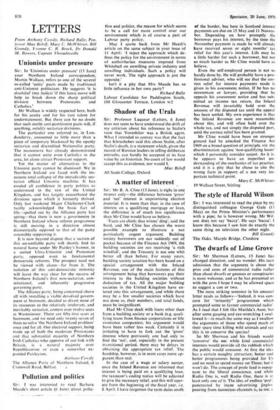The dwarfs of Lime Grove
Sir: Mr Sherman (Letters, 13 June) has changed direction, and no wonder. His tacit admission that the argument is about the pros and cons of commercial radio rather than about dwarfs or gnomes or conspiracies is most welcome, and as he has presented us with the pros I hope I may be allowed space to suggest a con or two.
The most striking sentence in his unusual letter reads as follows—Indeed, it was con- cern for "minority" programmes which prompted some to favour commercial radio'. As I read that I felt like Matilda's Aunt, but after some gasping and eye-stretching I swal- lowed it—in much the same way as I swallow the arguments of those who spend much of their spare time killing wild animals and say this is to conserve the species!
So Mr Sherman and his friends would `conserve' the BBC while kind commercial
interests would provide all the rubbish which - the public would consume. At first the idea has a certain naughty attraction; better and better programmes being provided for Us and no need to spend money on Them; but it won't do. The concept of prole feed is repug- nant to the liberal conscience, and while Radio One is, well Radio One, there is at least only one of it. The idea of endless `pop'.
punctuated by inane advertising jingles. pouring from numerous channels is, to me, a
horrifying one. Think of the frantic dial- twiddling that would be necessary to escape it. Think, moreover, of the interference %% ith Our programmes, since frequencies are far from being unlimited. No, it is certainly possible for us to have too much of a bad thing.
Mr Sherman, unlike any other advocate of commercial radio I have encountered, is honest enough to make no pretence that the programmes would have any intrinsic merit. He should not, however, suggest that com- mercial broadcasting is 'free', when all but the simplest realise that one pays through the shopping basket.



































 Previous page
Previous page